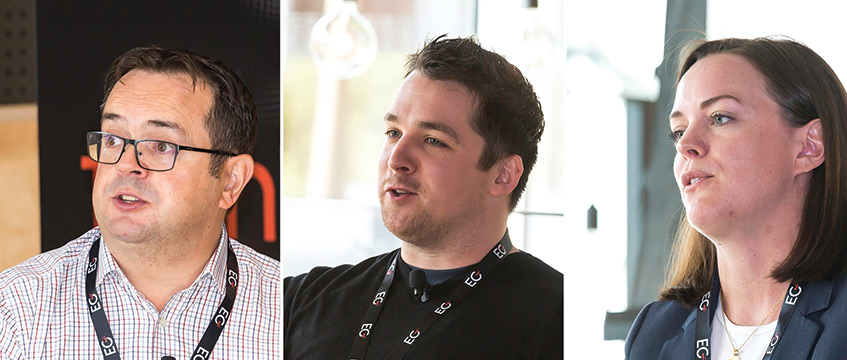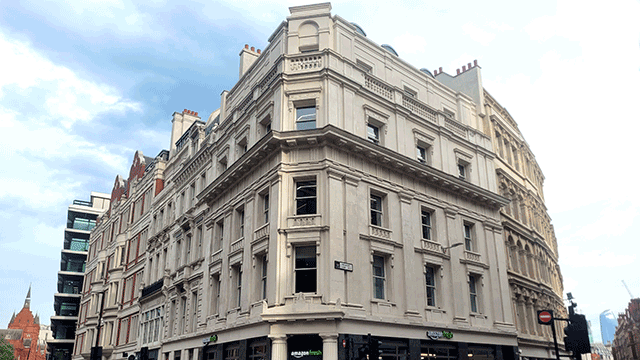Manchester needs new industries to grow or risk losing out to other regional cities, a panel argued at yesterday’s EG Tech Live.
Responding to a question about Manchester sustaining its competitive advantage over other parts of the UK, Mike Gedye (pictured left), executive director at CBRE, said the city needs to find its next generation of innovation.
“At the moment it might be in media and digital in Manchester. But what about life sciences? What about applied materials? What about big data?” he said.
The panel also said that Manchester’s challenge will be to avoid being a victim of its own success.
Gedye said: “Being successful is great, short-term, but you’ve got to sustain that. That’s about encouraging migrant workers to come here and encouraging graduates to stay.
“It’s about keeping the skills of other industries – upskilling – otherwise you find yourself quickly losing out to Liverpool, or a secondary or tertiary city.”
See more: Manchester has everything (except a beach)
Emma Long (pictured right), head of corporate strategy at LGIM Real Assets, agreed and said Manchester needs a unique offering to set it apart from other tech cities worldwide rather than try to emulate other success stories.
However, she added that the city was well positioned because it has sustained an innovative identity: “Manchester has that spirit of innovation going back to the industrial revolution. There is a lot to capitalise on that,” she said.
Though Manchester has been able to carve out an identity in the UK over the last few years, the city sees even greater competition from the US.
Doug Ward (pictured centre), co-founder of Node, a Manchester-based internet connectivity service, said: “I’m at fault at being a little bit googly-eyed at Elon Musk and Jeff Bezos, and the size of thinking that takes place in California and the west coast of America.
“As a city, we need to try to help the next generation resist selling to the Americans.”
He said part of the reason Manchester does not yet have a £10bn or £100bn tech business is because even if ideas originate in the city, those businesses eventually move to the US.
The next generation, Ward said, has to ensure that Manchester does not have a reputation for being “R&D for America”.
Views from the ground
The second panel of the morning focused on thoughts from those living and working in Manchester.
The panel:
Mike Anderson, chief executive, Padoq
Julie McGann, head of corporate wellbeing programmes, Unicorn & Co
Tom Renn, managing director, Manchester Science Park

What is Manchester getting right?
Anderson: “The quality of life, from the business perspective and personal perspective. It’s cheaper, it’s more convenient, you’ve got more opportunities [than London]. Manchester is at a really unique point where there’s so much money in the city and there’s so much opportunity, it’s a really good place to be.”
McGann: “It’s all about the community. We had investors, we had business leaders, people who wanted to mentor us. We all had a value to give to each other. That’s enormous for someone who’s starting out and needs that confidence and support. In London, it’s easier to get lost and lose your connections.”
Renn: “People are here because there’s a quality of life, there’s an accessibility, but at the same time, there’s this friendliness in Manchester. People just want to help each other. They want to speak to each other. They want to work together.”
What are the challenges of running a business in Manchester?
Anderson: “Development talent – IT technicians, developers – that has been a challenge for us as a tech company. However, the way of the world is changing. We have four developers based in Manchester, three who work remotely from London who we see every two weeks. But we work fine. Tech has allowed remote working to really be successful in an environment like this.”
McGann: “I’m a female founder and was quite ambitious about raising investment, and I found it extremely difficult. There are not many female investors in Manchester. How do you get exposure to that? You have to go abroad.”
Renn: “Foreign direct investment. Can we get US companies who are looking at the UK, to look at Manchester? At times we struggle with foreign direct investment. Some of it lands into the Department of International trade in London first. How well briefed are they about the northern offer? That’s something we continue to work at – raising the profile of the north.”
Photographs © James White
To send feedback, e-mail karl.tomusk@egi.co.uk or tweet @ktomusk or @estatesgazette











